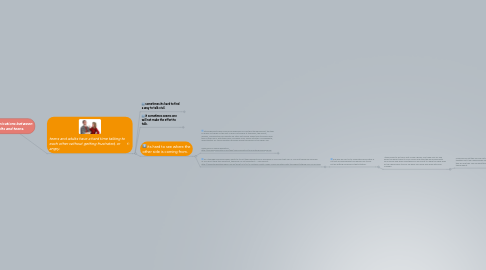
1. teens and adults have a hard time talking to each other without getting frustrated, or angry.
1.1. sometimes its hard to find a way to talk civil.
1.1.1. 1.1 Project Kick Off
1.1.1.1. Recruit Project Sponsor
1.1.1.2. Recruit Project Manager
1.1.1.3. Review Related Projects and Lessons Learned
1.1.1.4. Prepare Project Initiation Plan
1.1.1.5. Brief the Initial Project Team
1.1.1.6. Review Project Kick-off Plans and Presentation Map
1.1.1.7. Hold Project Kick-off Meeting
1.1.2. 1.2 Project Objective & Scope
1.1.2.1. Establish Project Objective
1.1.2.2. Establish Project Scope
1.1.2.3. Map Requirements
1.1.2.4. Map Solution
1.1.2.5. Map Training Requirement
1.1.2.6. Review Project Scope
1.1.3. 1.3 Project Schedule and Budget
1.1.3.1. Determine Project Approach, Stages and Steps
1.1.3.2. Estimate Project Duration
1.1.3.3. Establish Resource Requirements
1.1.3.4. Prepare Project Schedule and Budget
1.1.3.5. Prepare Work breakdown structure
1.1.3.6. Document Success Criteria
1.1.3.7. Review Project Schedule
1.1.4. 1.4 Project Organization
1.1.4.1. Identify Project Resources
1.1.4.2. Recruit Project Steering Committee
1.1.4.3. Recruit Project Coordinators
1.1.4.4. Identify / Recruit Key Stakeholders
1.1.4.5. Determine Training Requirements
1.1.4.6. Map the Project Organization Chart
1.1.4.7. Review Project Organization
1.1.5. 1.5 Project Control Procedures
1.1.5.1. Establish Project Administration Procedures
1.1.5.2. Establish Quality Control Procedures
1.1.5.3. Establish Progress Control Procedures
1.1.5.4. Establish Change Control Procedures
1.1.5.5. Establish Issue Resolution Procedure
1.1.5.6. Review Project Control Procedures
1.1.6. 1.6 Develop Business Case
1.1.6.1. Estimate Project Costs
1.1.6.2. Identify and Quantify Benefits
1.1.6.3. Determine Break-even Point
1.1.6.4. Analyze Risk
1.1.6.5. Review Business Case
1.1.7. 1.7 Project Initiation Stage Assessment
1.1.7.1. Prepare Initiation Stage Assessment
1.1.7.2. Review Initiation Stage Assessment
1.1.7.3. Follow-Up Initiation Stage Assessment
1.1.7.4. Compile Project Initiation Report
1.2. it sometimes seems one will not make the effort to talk.
1.2.1. 2.1 Stage Kick-Off
1.2.1.1. Establish checkpoints
1.2.1.2. Acquire team resources for stage
1.2.1.3. Conduct stage kick-off meeting
1.2.2. 2.2 Project Steering Committee Meetings
1.2.2.1. Determine Frequency of Meetings
1.2.2.2. Schedule Meetings
1.2.2.3. Brief Project Board
1.2.2.4. Prepare Meetings
1.2.2.5. Conduct Meetings
1.2.2.6. Follow-up Meeting
1.2.3. 2.3 Quality Control
1.2.3.1. Schedule Quality Review Meeting
1.2.3.2. Prepare for Quality Review Meeting
1.2.3.3. Conduct Quality Review Meeting
1.2.3.4. Follow-up Quality Review Meeting
1.2.4. 2.4 Progress Control
1.2.4.1. Update Project Schedule
1.2.4.2. Update Budget / Costs
1.2.4.3. Conduct Team Status Review
1.2.4.4. Create Status Report
1.2.5. 2.5 Change Control
1.2.5.1. Request Changes
1.2.5.2. Identify Alternative Solutions
1.2.5.3. Conduct Steering Committee Meeting
1.2.5.4. Document Change Responses
1.2.5.5. Implement Change(s)
1.2.6. 2.6 Issues Management
1.2.6.1. Identify Project Issues
1.2.6.2. Assess Impact of Issues
1.2.6.3. Assign Resources
1.2.6.4. Resolve Issue
1.2.7. 2.7 Stage Closure Assessment
1.2.7.1. Determine Next Stage Tasks
1.2.7.2. Determine Task Dependencies
1.2.7.3. Estimate Effort
1.2.7.4. Allocate Resources
1.2.7.5. Prepare Next Stage Schedule
1.2.7.6. Prepare Next Stage Budget
1.2.7.7. Update Project Schedule
1.2.7.8. Update Project Budget
1.2.7.9. Review Business Case
1.2.7.10. Review Project Organization
1.2.7.11. Review Project Scope
1.2.7.12. Prepare Stage Assessment
1.2.7.13. Review Stage Assessment
1.2.7.14. Follow-Up Stage Assessment
1.2.7.15. Compile Stage Closure Report
1.3. its hard to see where the other side is coming from.
1.3.1. Although adults have much more experience in life than the adolescent, the teen is usually not aware of this fact or does not believe it; therefore, the advice, wisdom, and directions of parents are often not valued. Teens tend to spend more time in their room, with their peers, and away from family activities. Consequently, opportunities for communication diminish during this period of the child's life. Read more on FamilyEducation: http://life.familyeducation.com/teen/communication/39355.html#ixzz3GyhRJilb
1.3.1.1. Prepare Product Evaluation
1.3.1.2. Conduct Product Evaluation
1.3.1.3. Initiate Maintenance Process
1.3.2. All a teenager perceives when adults try to put their perspective on a problem is “you don’t get me” or “you not taking me seriously” or “you don’t think this important, therefore I’m not important.” - See more at: http://understandingteenagers.com.au/blog/2010/07/5-mistakes-adults-make-communicating-with-teenagers/#sthash.0pX4o2Q7.dpuf
1.3.2.1. one way we can try to understand each other is not just by hearing what one person has to say but by putting ourselves in that situation.
1.3.2.1.1. i think a way to do this is sort of like a game, you trade lives for one week. the parent goes to your school and does the work hangs with your friends and does everything you are s'post to. while the child does all the chores goes to your job does your work and deals with your colleges.

